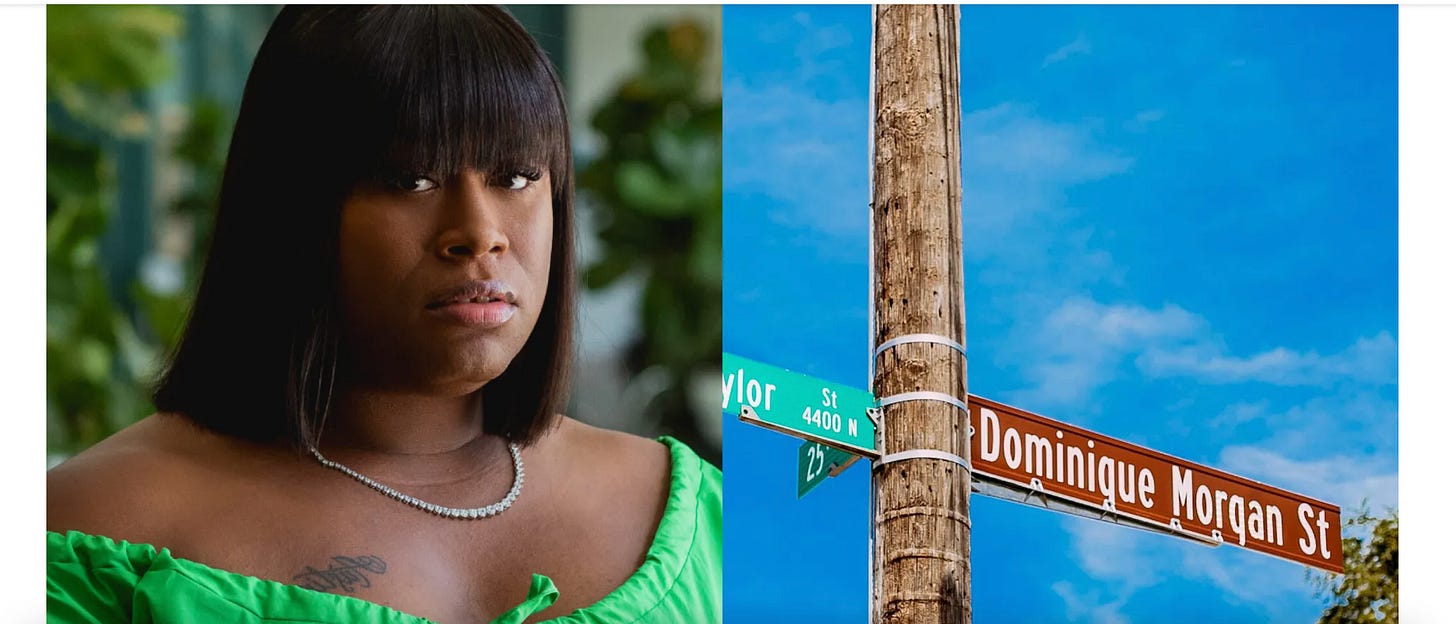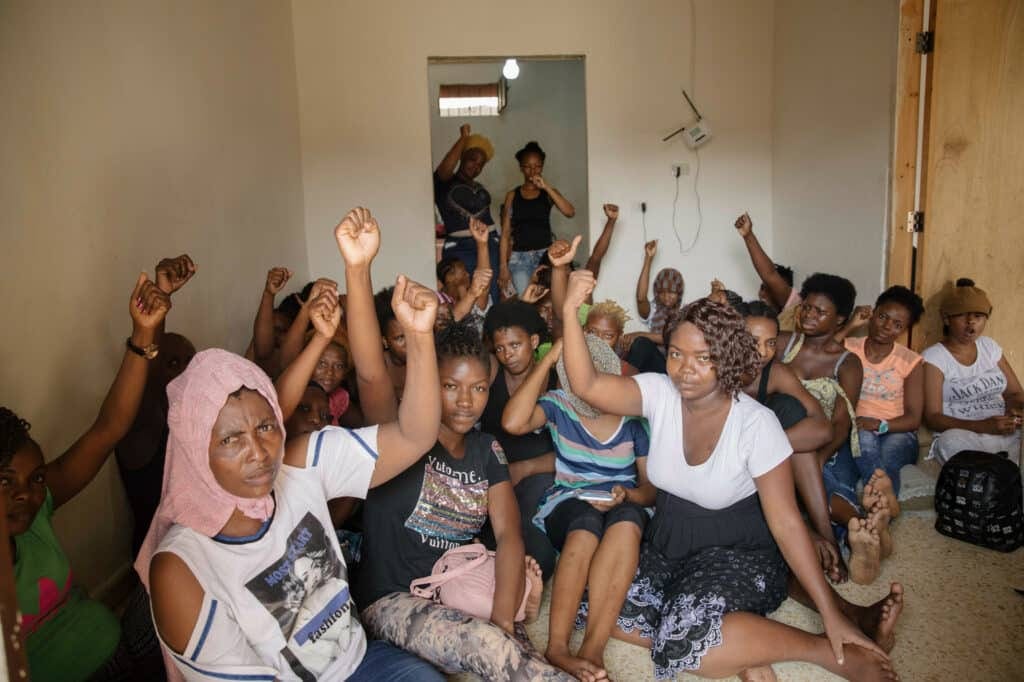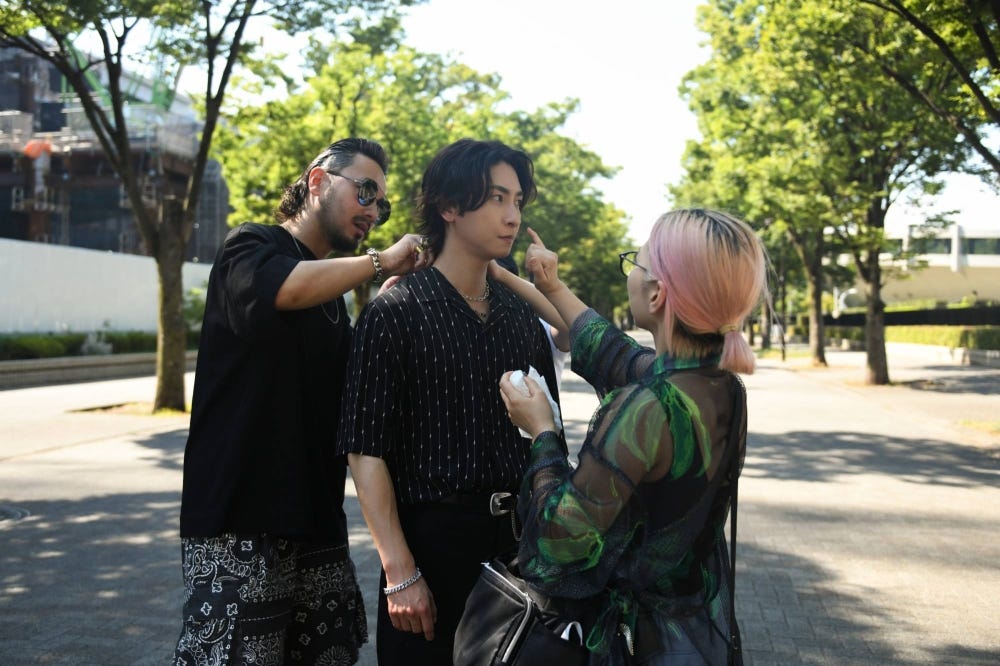Global Roundup: Street Named After Black Trans Woman, Polish Activist Aiding Ukrainian Women, Migrant Women Photographs, Saudi Arabia Human Rights Defender, Japan LGBTQ Celebrities
Curated by FG Contributor Samiha Hossain
Domonique Morgan
Domonique Morgan, an activist in the U.S., is believed to be the first out Black trans woman to have a street named in her honor. Morgan is also the first formerly incarcerated person to receive that honor in Nebraska history.
Morgan is currently the director of the Fund for Trans Generations at the social justice philanthropy organization, Borealis Philanthropy. She’s a longtime organizer for the abolition of the prison industrial complex, having served as the executive director of queer abolitionist organization Black and Pink from 2018 to 2022. At the end of July, the Omaha City Council unanimously voted to rename a street in Morgan’s honor. It’s a street that has deep personal significance to Morgan, a longtime resident of Omaha, as she explained at a naming ceremony held by the reproductive justice organization I Be Black Girl on Monday.
There is something incredibly moving about the idea that young Black folks will walk down a street in a historically Black neighborhood named after a Black trans woman, who at the age of 12 was placed into the back of a police car for the first time on the exact street. And at 16, she found herself navigating homelessness. And by 18, incarceration. -Domonique Morgan
Morgan added that her maternal grandmother owned a home on that street, where she realized her “queerness and trans identity as a child.” She went on to say that the street naming ceremony “is a declaration to the world that the existence of trans people is non-negotiable.”
Kateryna Shukh (bottom left) poses with fellow refugee women
Nastya Podorozhnya is a Ukrainian journalist and activist living in Krakow, Poland, and founder of grassroots feminist organisation Martynka. The organisation provides access to Ukrainian-language psychotherapy for refugee victims and survivors of sexual violence, as well as sharing safety advice, practical resources to help refugees navigate their new home and information on sexual and reproductive health.
After Russia launched its full-scale invasion on Ukraine in February 2022, many Ukrainians had to flee to surrounding countries. Some saw it as an opportunity to harm and exploit women and girls at their most vulnerable. Women’s organisations have documented cases where traffickers present themselves to young women as boyfriends, promising safety and the chance to start a new life in a new country. Having tricked their victims into trusting them, they traffic the women and girls across borders, into a life of sexual violence.
Inna (not her real name) was just a teenager when she fled her home in Ukraine and met a man offering her a relationship and a fresh start together. She believed they were in love, but his promises turned out to be lies. Shortly after meeting him, Inna was trafficked, drugged and sold into sexual exploitation. When she arrived in Poland, she was also pregnant for the first time. It was at Martynka where, having escaped her abusers, Inna found a sanctuary.
We made online content and put stickers in public bathrooms. We set up a hotline for women and girls to call. Now we have grown to operate a safehouse for women like Inna. She is one of the bravest women I have talked to over this last year and a half. -Nastya Podorozhnya
Inna chose to keep her baby, but many of the women arriving from Ukraine into Poland are looking for information about reproductive healthcare – not easy in a country where those providing abortions outside the legal exemptions face lengthy prison sentences. Women, girls and pregnant people can only access terminations in cases of threat to the mother’s life, and rape or incest. Martynka operates within Poland’s strict laws to help women answer questions about their reproductive rights, offering accurate and legal information. However, for women fleeing Ukraine into Poland, and who are pregnant as a result of rape being used as a weapon of war, the chance of accessing an abortion without legal documents proving they have been the victim of sexual abuse are slim.
Martynka is eagerly awaiting the birth of Inna’s baby. But Nastya Podorozhnya is worried about the future the child will be born into. As the war in Ukraine continues, more women are in urgent need of the care and support they offer – but international attention is waning as time goes by.
BEIRUT, LEBANON – 23/09/2020: Former domestic workers from Sierra Leone await for their repatriation. Photo by Aline Deschamps
Photographer Aline Deschamps met migrant women in Beirut who are living precariously. Most of them were women from Sierra Leone, tricked into travelling to Lebanon thinking that the country needed their professional profiles, like teachers, or nurses. Once they arrived in Lebanon, they were forced into someone’s house to wash dishes, do chores, and sleep on the balcony, often without receiving any remuneration for months. If they demanded to be moved to another employer or to be repatriated, they were threatened, beaten, raped.
The guardianship system called Kafala is what makes this kind of human trafficking possible. The Kafala sees a guardian or sponsor, called “kafeel”, responsible for the worker’s visa and legal status, establishing also his or her salary and working conditions. It allows guardians to take away their employees’ passports, confiscate their phones, and subject them to abuse with little or no legal repercussions. Human rights advocates have long called for the abolishment of the Kafala system.
Basically your life depends on one individual. Maybe you’ll have a good employer who will pay you and won’t take away your day off, and won’t take away your passport, or maybe you’ll have someone who does it. And agents suggest they do that. ‘She’s not behaving well? just lock her up, take the passport’. It’s systematic. -Aline Deschamps
When Aline Deschamps started her project in 2020, Lebanon was in the middle of an economic collapse that it still hasn’t recovered from. The pandemic exacerbated the situation, and domestic workers were often thrown out on the streets because their employers, or guardians, didn’t want to be responsible for them anymore. As Aline Deschamps got to know the migrant women, the way they answered her questions unveiled a much darker scenario than the one she had initially envisioned.
The photographs are different from what we’re used to in the documentary tradition. If they don’t shy away from showing the women’s struggle, they also refuse to place any labels on them. It captures women like Lucy Turay: a teacher who left to Lebanon shortly after giving birth and came back to Sierra Leone to meet a 3-year-old daughter who didn’t recognize her as her mom and founded an organization to prevent others from falling into the same trap. She gathered a group of women to walk the markets where recruitment usually happens, holding signs and loudspeakers to unmask the machine that enslaved them.
The photographer reconnected in Sierra Leone with the women she had gotten to know in Lebanon, and met some others who had recently repatriated from other Gulf countries. Looking at the images of “A Life After Kafala”, the second part of her project, one wouldn’t know the protagonists of the project are domestic workers, nor that they’ve been trafficked, or raped.
I wanted the photographs to be much softer and contemplative, in contrast with the harsh realities that they’ve endured. -Aline Deschamps.
Loujain Al-Hathloul
In 2021, Loujain announced that the authorities had conditionally released her after having spent more than two and a half years in prison for defending women’s rights. Her efforts included demanding an end to the male guardianship system and to the ban on women’s driving. Despite her release from prison, she cannot freely express her opinions on social media or to the media, find suitable job opportunities, or go abroad to start a new life.
The executive director of the Gulf Centre for Human Rights, Khalid Ibrahim, recently conducted an interview with Lina Al-Hathloul, a human rights defender and Loujain’s sister. Lina speaks about the children's book she wrote to tell her sister Loujain’s story.
In the story, the little girl Loujain wants to fly using her wings, but only boys had the right to fly. After much suffering and determination to succeed, her family understood her desire and agreed to teach her to fly so that her story became one of an inspiring heroine who encouraged young girls to learn to fly as well. - Lina Al-Hathloul
Lina mentions how her family has been supportive of the daughters in the family. In 2013, her father filmed Loujain driving for the first time, at a time when women were still not allowed to drive. The video went viral, and, as her guardian, their father took full responsibility.
Lina says she wrote the children’s book so that children can understand that “injustice must be confronted, and that we can try to change our societies for the better.”
On a personal level, I wanted to ensure that Loujain’s name is remembered by future generations, so that they know that my sister was one of the pioneers who contributed to change and to the attainment of this right. -Lina Al-Hathloul
Shinjiro Atae, a J-pop idol who came out publicly as gay during a recent fan event, with his stylist and makeup artist in the afternoon prior to his announcement, in Tokyo on July 25. | NORIKO HAYASHI / THE NEW YORK TIMES
In Japan, coming out as a member of the LGBTQ community is still complicated, but more people are feeling empowered as celebrities are coming out publicly. Pop star Shinjiro Atae from J-pop group AAA came out publicly as being gay at a fan event in Tokyo late last week, attracting attention both in Japan and overseas.
Maki Muraki, the director of Nijiro Diversity, a nonprofit organization that works to support and protect sexual minorities, says celebrities making such announcements can have a big impact in Japan, where it can be difficult for people to discuss LGBTQ issues. However, such decisions are rarely made easily. Mika Yakushi, a representative of nonprofit organization ReBit that supports LGBTQ children in Japan, agrees with Muraki, saying Atae’s announcement is undoubtedly encouraging for LGBTQ youths around Japan, since it remains extremely difficult for not just celebrities but people in sports, politics and business to come out.
The memory of popular TV personality and LGBTQ advocate ryuchell's suicide remains painfully fresh among Japan’s LGBTQ community. Ryuchell had been receiving a lot of hate online since divorcing their partner to explore their gender identity in 2022. While the exact reason for ryuchell's suicide is unclear, some people say bullying may have been the cause.
On one hand, famous individuals coming out publicly definitely spreads awareness and a positive image of the LGBTQ community, creating role models, but on the other hand, that individual may receive a backlash following their disclosure, which would negatively affect their lives. -Anri Ono, co-chair of Proud Futures
Muraki encourages people to make use of hotlines so that they can get support and guidance. She said her group has received over 10,000 calls since Atae introduced the organization on his website. The advocates agree that to achieve equal rights for all, changes will have to come not just in the form of public opinion but also on the legal front, such as through the legalization of same-sex marriages.
I want the (younger generation) to know that with the current Japanese law their LGBTQ friends might not be able to have the future they want. I want people to go vote and vote for candidates who support same-sex marriage. That will help friends and other people close to you. -Maki Muraki
Samiha Hossain (she/her) is a student at the University of Ottawa. She has experience working with survivors of sexual violence in her community, as well as conducting research on gender-based violence. A lot of her time is spent learning about and critically engaging with intersectional feminism, transformative justice and disability justice.
Samiha firmly believes in the power of connecting with people and listening to their stories to create solidarity and heal as a community. She refuses to let anyone thwart her imagination when it comes to envisioning a radically different future full of care webs, nurturance and collective liberation.







I continue to read these roundups and be impressed by human signs of evolution. Until all humans matter, we have work to do. And that's just the beginning.